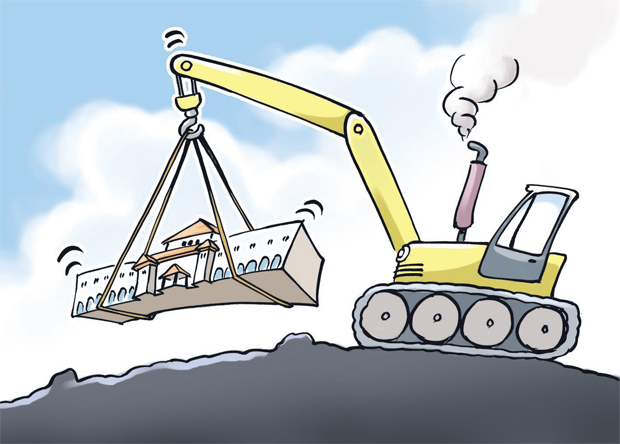
The housing and the real estate business (HREB) has a double-sword positive effect on the economy. It is a global perspective to this business, perhaps barring Nepal. It is a capital intensive business like any other profit making venture and, at the same time, helps to solve a pressing problem of shelter to the populace. But despite the potential, Nepali HREB languishes in absurdities and hangs on to uncertainties. It has been more than one and a half decades since HREB began in an organised fashion led by private sector investment. But the bottlenecks of policy confusions, information asymmetries and public (mis)perceptions remain the same as they used to be a decade ago.
According to a rough estimate, Nepali HREB is now worth more than Rs 150 billion, which is a third of the current year's national budget. There is an estimated annual demand of some forty five thousand units of family apartments, mainly in the urban centres of the country. Half of the demand is only in the Kathmandu valley. But, the total annual cumulative supply of apartment-type living is limited only to sixteen thousand units nation-wide. The demand and supply mis-match is one half of the story and the price and financing mismatch is the other.
What's wrong with Nepali HREB as an investment and growth industry? Perhaps everything! The government doesn't have a comprehensive policy on it. In addition, the very perspective of the government about HREB is largely bigotry. Some regulations regarding ownership have been issued but implementation has not been as effective as expected. Given the fact that the private sector is doing a national service by providing housing facilities to the people which otherwise is the government’s responsibility, it should have acknowledged and treated accordingly. As long as the government considers itself as the vehicle to an egalitarian society, it is indeed the government’s responsibility to address problems like this.
One emulative recent example could be the British government’s initiative of Help-to-Buy (HTB) scheme, introduced by Chancellor George Osborne’s last fiscal year budget, targeting the first time home owners. The £25 billion scheme that began in January 2014 plans equity finance of 20 percent of the cost of buying or constructing a new house. The government plans to implement the HTB scheme in a three year time horizon. The objectives are well defined. First, to help revive the ailing HREB and also simultaneously support lower end populace to own a house of their own.
But in our case, the government is treating the investors and developers as criminals and crooks, let alone contemplating providing an equity financing. It was true that there was a degree of over-exposure of the finical sector to HREB. But that was a compulsion at a point of time due to utter lack of other sectors for the BFIs to invest. Shouldn't the government share the blame for failing to create an atmosphere for a diversified business and thus the BFIs' investment? Instead, the government apparatus is at complete loss of direction to address the problems of the sector. On top of that a rung of top public service officials were determined to ruin the entire HREB.
Without naming names, there are projects in limbo which would have been completed well if the institutions like the central bank wouldn't have been vindictive to some chosen promoters of the schemes. It is true that some developers had had multiple business stakes and resorted to some duplicity. But the right approach for the government and central bank strategy should have been to save the projects and investment and penalize and admonish only the wrong-doers. To say the least, the government has not been sensitive to the potential ramifications of its apathy and antipathy to HREB.





















